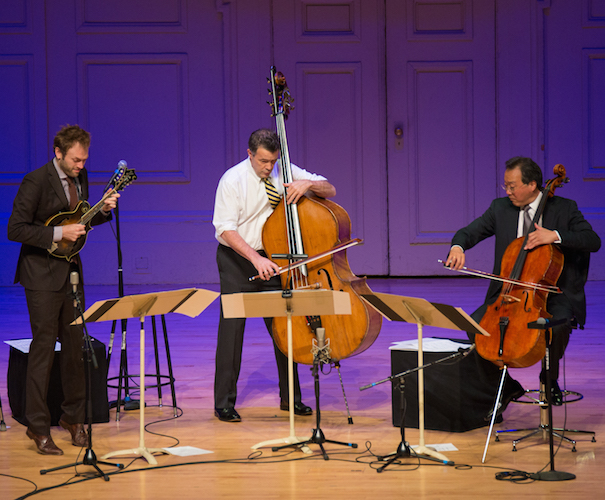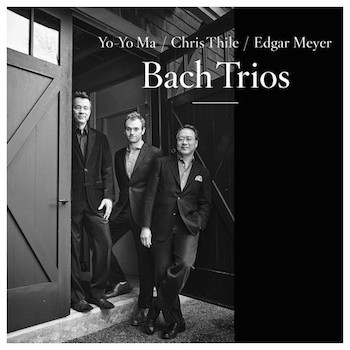Concert Review: “Bach Trios” — Yo-Yo Ma, Edgar Meyer, and Chris Thile
The wondrous J.S. Bach has been subjected to every imaginable kind of transcription, although the combination of mandolin, bass, and cello is probably one that hasn’t been attempted before.

Yo-Yo Ma, Edgar Meyer, and Chris Thile perform on the Celebrity Series Friday night at Symphony Hall. Photo: Robert Torres.
By Susan Miron
“In the end, we’re simply trying to make music that transcends whatever roots or categories or backgrounds it starts from — that just exists as something that we’re trying to express, through our community of values, as a moment in time creating very special music.” — Yo Yo Ma
Friday night at a sold-out Symphony Hall in Boston, three extremely well-known, lavishly honored, and deeply respected instrumentalists (presented by the Celebrity Series) began their J.S. Bach CD tour. Set against an empty stage bathed in lilac lighting, the longtime friends and collaborators made for a alluring sight. Cellist (and so much more) Yo-Yo Ma looked stylishly patrician in an elegant suit. Bassist (and renowned composer) Edgar Meyer wore a tie and a white shirt, sleeves rolled up, looking ready to gig in a jazz club. He played the double bass as well as it possibly can be played, and looked utterly serious through most of the concert. Mandolinist (and the new host of the nationally popular radio show Prairie Home Companion) Chris Thile wore an assortment of brown clothing, including a brown tie and jacket. He was a picture of unrestrained joy and enthusiasm from the moment he strode onstage.
The audience seemed to consist of Yo-Yo fans and of younger devotees of Chris Thile. The latter is a musician who is impossible to pigeonhole: a singer, songwriter, member of the progressive acoustic trio Nickel Creek and the acoustic folk/progressive blue grass quintet Punch Brothers. Both he (2012) and Meyer (2002) are recipients of MacArthur Fellowships. Ma has won a boatload of awards, the most significant one being the initial Fred Rogers Award, given several years ago. His accomplishments are manifold, but the most interesting may be his long-lasting friendships, which have resulted in some astonishingly good music-making. Those who heard this threesome in their concerts for 2011’s Goat Rodeo Sessions CD got a radically different look at them through the prism of J. S. Bach, a composer all three adore.
“We joined together by our love of Bach which I believe we share with you,” Ma announced at the concert’s beginning. The wondrous J.S. Bach has been subjected to every imaginable kind of transcription, although the combination of mandolin, bass, and cello is probably one that hasn’t been attempted before. The results were fascinating and, in the adroit hands of such virtuosi, consistently pleasant. Each received an opportunity to show off his dazzling instrumental chops. Still, it would have been nice to know who should be credited for these clever transcriptions. In fact, there was some confusion about what was being played; the audience were supposed to be informed of what was on program from onstage announcements, which were not always effective. I would have really appreciated a printed program. There must have been a planned line-up; the trio certainly wasn’t improvising its program. This is the first stop on the trio’s tour, and they most likely are repeating the program each time. But that about ends my quibbles. Thile is a very entertaining musician. This was my first time hearing Meyer perform live, and his bass playing is seriously compelling. I heard their new CD earlier that day, and can testify that this music is infinitely more fun to hear live.

The concert (and CD) consisted of the Trio Sonata No. 6 in G Major, BWV 530; Chorale Preludes, selections from The Well-Tempered Clavier, including Prelude and Fugue No. 18, BWV 548; the 3-movement Sonata for Viola da Gamba No. 3 in G minor (which let Yo-Yo shine in the spotlight), and two selections from Art of the Fugue, BWV 1080. Everything was played with panache, joy, and dazzling technique. It was obvious these three men really respect and like each other, and love playing together.
The audience was treated to two encores — the bluesy Quarter Chicken Dark from their CD Goat Rodeo Sessions and the Passepied from the Keyboard Partita No. 5 in G Major. Recently I’ve tackled a Bach Prelude project on the harp, so I am particuarly aware of the immense difficulties — and excitement — of playing this music. While I might not recall what pieces they played — and when on the program they played it — I will remember Thile’s thrilling mandolin playing, and Ma’s always-beautiful Bach. This classy Valentine to Bach is first-class entertainment, familiar music in a refreshing new guise.
Susan Miron, a harpist, has been a book reviewer for over 20 years for a large variety of literary publications and newspapers. Her fields of expertise were East and Central European, Irish, and Israeli literature. Susan covers classical music for The Arts Fuse and The Boston Musical Intelligencer. She is part of the Celtic harp and storytelling duo A Bard’s Feast with renowned storyteller Norah Dooley and, until recently, played the Celtic harp at the Cancer Center at Newton Wellesley Hospital.
Tagged: Celebrity-Series-of-Boston, Chris Thile, Edgar Meyer, The Bach Trios
